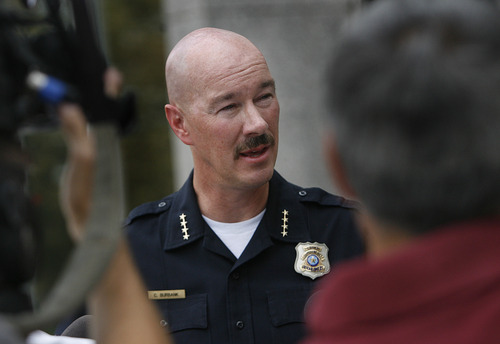This is an archived article that was published on sltrib.com in 2014, and information in the article may be outdated. It is provided only for personal research purposes and may not be reprinted.
Whether it's the down and out in Salt Lake City or the fearful and fed-up in Ferguson, Mo., the heavy burden that sits on the shoulders of law enforcement officers everywhere is to reduce the number of victims, not add to it.
And to make sure that those in need feel reassured, not frightened, by the sight of a police officer.
In Salt Lake City, efforts to bring peace and solace to the many homeless people who tend to congregate near the city's Pioneer Park, west of downtown, have taken the form of the police department's new Metro Support Bureau Resource Center at 420 W. 200 South.
Under Mayor Ralph Becker and Police Chief Chris Burbank, the city's focus on dealing with the homeless has included extra efforts to treat those pool souls as, well, poor souls. As victims rather than criminals. As people who need a hand, some care, access to housing, not a nightstick upside the head and a night in jail.
Not that the police aren't arresting people in and around Pioneer Park. They are. Given that the homeless population is always going to include more than its share of the mentally ill and people with substance-abuse problems, that group is always going to present police with some who victimize and many who are victims.
But the city's efforts to provide housing for the homeless, especially for veterans, have been recognized at the White House and elsewhere as among the nation's most successful. And a police station that incorporates in its mission the presence of social service agencies, whose workers and volunteers work alongside law enforcement officers to sort the criminals from the lost is a big part of that effort.
Yes, the Salt Lake City Police Department is under a lot of criticism right now. One of its officers shot and killed a young man in a confrontation outside a convenience store, under circumstances that are still under investigation. Another officer killed a dog in its own backyard while the officer was searching for a missing child.
Many more such incidents, and the department's image as a group of professionals who are admirably slow on the draw may suffer.
Still, at least at the policy-making level, Salt Lake City's approach to crime is one of patience, compassion and concern for those who have already been abused enough by life that they neither need nor deserve to be punished by the law.
Instead of playing war in camos and helmets, as happens far too often elsewhere, police here are held to a higher standard. They are expected to keep the peace.



